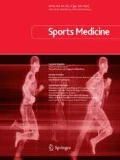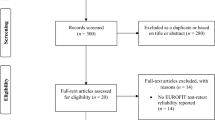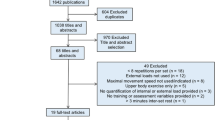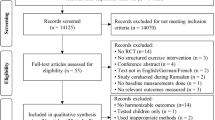Abstract
The reliability of power in tests of physical performance affects the precision of assessment of athletes, patients, clients and study participants. In this meta-analytic review we identify the most reliable measures of power and the factors affecting reliability. Our measures of reliability were the typical (standard) error of measurement expressed as a coefficient of variation (CV) and the percent change in the mean between trials. We meta-analysed these measures for power or work from 101 studies of healthy adults. Measures and tests with the smallest CV in exercise of a given duration include field tests of sprint running (∼0.9%), peak power in an incremental test on a treadmill or cycle ergometer (∼0.9%), equivalent mean power in a constant-power test lasting 1 minute to 3 hours on a treadmill or cycle ergometer (0.9 to 2.0%), lactate-threshold power (∼1.5%), and jump height or distance (∼2.0%). The CV for mean power on isokinetic ergometers was relatively large (>4%). CV were larger for nonathletes versus athletes (1.3 ×), female versus male nonathletes (1.4 ×), shorter (∼1-second) and longer (∼1-hour) versus 1-minute tests (≤1.6 ×), and respiratory- versus ergometer-based measures of power (1.4 to 1.6 ×). There was no clear-cut effect of time between trials. The importance of a practice trial was evident in studies with >2 trials: the CV between the first 2 trials was 1.3 times the CV between subsequent trials; performance also improved by 1.2% between the first 2 trials but by only 0.2% between subsequent trials. These findings should help exercise practitioners and researchers select or design good measures and protocols for tests of physical performance.











Similar content being viewed by others
References
Hopkins WG. Measures of reliability in sports medicine and science. Sports Med 2000; 30: 1–15
Hopkins WG, Hawley JA, Burke LM. Design and analysis of research on sport performance enhancement. Med Sci Sports Exerc 1999; 31: 472–85
Hopkins WG. A new view of statistics. Sportscience [online]. Available from: URL: http://sportsci.org/resource/stats [Accessed 2001 Jan 4]
Sawka MN, Tahamont MV, Fitzgerald PI, et al. Alactic capacity and power: reliability and interpretation. Eur J Appl Physiol 1980; 45: 109–16
Jackson AA, Baumgartner TA. Measurement schedules of sprint running. Res Q 1969; 40: 708–11
Risberg MA, Holm I, Ekeland A. Reliability of functional knee tests in normal athletes. Scand J Med Sci Sports 1995; 5: 24–8
Fitzsimons M, Dawson B, Ward D, et al. Cycling and running tests of repeated sprint ability. Aust J Sci Med Sport 1993; 25: 82–7
Jensen K, Johansen L. Reproducibility and validity of physiological parameters measured in cyclists riding on racing bikes placed on a stationary magnetic brake. Scand J Med Sci Sports 1998; 8: 1–6
Schabort EJ, Hopkins WG, Hawley JA, et al. High reliability of performance of well-trained rowers on a rowing ergometer. J Sports Sci 1999; 17: 627–32
Buono MJ, Borin TL, Sjoholm NT, et al. Validity and reliability of a timed 5 km cycle ergometer ride to predict maximum oxygen uptake. Physiol Meas 1996; 17: 313–7
Palmer GS, Dennis SC, Noakes TD, et al. Assessment of the reproducibility of performance testing on an air-braked cycle ergometer. Int J Sports Med 1996; 17: 293–8
Smith ME, Davison RCR, Balmer J, et al. Reliability of mean power recorded during indoor and outdoor self-paced 40-km cycling time trials. Int J Sports Med. In press
Lindsay FH, Hawley JA, Myburgh KH, et al. Improved athletic performance in highly trained cyclists after interval training. Med Sci Sports Exerc 1996; 28: 1427–34
Jeukendrup A, Saris WHM, Brouns F, et al. A new validated endurance performance test. Med Sci Sports Exerc 1996; 28: 266–70
Hickey MS, Costill DL, McConell GK, et al. Day to day variation in time trial cycling performance. Int J Sports Med 1992; 13: 467–70
Schabort EJ, Hawley JA, Noakes TD, et al. A new reliable laboratory test of endurance performance for road cyclists. Med Sci Sports Exerc 1998; 30: 1744–50
Madsen K, Maclean DA, Kiens B, et al. Effects of glucose, glucose plus branched-chain amino-acids, or placebo on bike performance over 100 km. J Appl Physiol 1996; 81: 2644–50
Nicholas CW, Nuttall FE, Williams C. The Loughborough Intermittent Shuttle Test: a field test that simulates the activity pattern of soccer. J Sports Sci 2000; 18: 97–104
Doyle JA, Martinez AL. Reliability of a protocol for testing endurance performance in runners and cyclists. Res Q Exerc Sport 1998; 69: 304–7
Widrick JJ, Costill DL, Fink WJ, et al. Carbohydrate feedings and exercise performance: effect of initial muscle glycogen concentration. J Appl Physiol 1993; 74: 2998–3005
Williams JH, Barnes WS, Signorile JF. A constant-load ergometer for measuring peak power output and fatigue. J Appl Physiol 1988; 65: 2343–8
Cheetham ME, Williams C, Lakomy HKA. A laboratory running test: metabolic responses of sprint and endurance trained athletes. Br J Sports Med 1985; 19: 81–4
Withers RT, Van Der Ploeg G, Finn JP. Oxygen deficits incurred during 45, 60, 75 and 90-s maximal cycling on an air-braked ergometer. Eur J Appl Physiol 1993; 67: 185–91
Patton JF, Murphy MM, Frederick FA. Maximal power outputs during the Wingate anaerobic test. Int J Sports Med 1985; 6:82–5
Nicklin RC, O’Bryant HS, Zehnbauer TM, et al. A computerized method for assessing anaerobic power and work capacity using maximal cycle ergometry. J Appl Sports Sci Res 1990; 4: 135–40
Coggan AR, Costill DL. Biological and technological variability of three anaerobic ergometer tests. Int J Sports Med 1984; 5: 142–5
Simoneau JA, Lortie G, Boulay MR, et al. Tests of anaerobic alactacid and lactacid capacities: description and reliability. Can J Appl Sports Sci 1983; 8: 266–70
Weinstein Y, Bediz C, Dotan R, et al. Reliability of peak-lactate, heart rate, and plasma volume following the Wingate test. Med Sci Sports Exerc 1998; 30: 1456–60
Evans JA, Quinney HA. Determination of resistance settings for anaerobic power testing. Can J Appl Sports Sci 1981; 6: 53–6
Bosco C, Luhtanen P, Komi PV A simple method for measurement of mechanical power in jumping. Eur J Appl Physiol 1983; 50: 273–82
Macfarlane DJ, Edmond IM, Walmsley A. Instrumentation of an ergometer to monitor the reliability of rowing performance. J Sports Sci 1997; 15: 167–73
Bishop D. Reliability of a 1-h endurance performance test in trained female cyclists. Med Sci Sports Exerc 1997; 29: 554–9
Schabort EJ, Hopkins WG, Hawley JA. Reproducibility of self-paced treadmill performance of trained endurance runners. Int J Sports Med 1998; 19: 48–51
Wiklander J, Lysholm J. Simple tests for surveying muscle strength and muscle stiffness in sportsmen. Int J Sports Med 1987; 8: 50–4
Viitasalo JT. Evaluation of explosive strength for young and adult athletes. Res Q Exerc Sport 1988; 59: 9–13
Ashley CD, Weiss LW. Vertical jump performance and selected physiological characteristics of women. J Strength Cond Res 1994; 8: 5–11
Harman EA, Rosenstein MT, Frykman PN, et al. The effects of arms and countermovement on vertical jumping. Med Sci Sports Exerc 1990; 22: 825–33
Young W, Macdonald C, Heggen T, et al. An evaluation of the specificity, validity and reliability of jumping tests. J Sports Med Phys Fitness 1997; 37: 240–5
Bosco C, Belli A, Astrua M, et al. A dynamometer for evaluation of dynamic muscle work. Eur J Appl Physiol 1995; 70: 379–86
Avis FJ, Hoving A, Toussaint HM. A dynamometer for the measurement of force, velocity, work and power during an explosive leg extension. Eur J Appl Physiol 1985; 54: 210–5
Bosco C, Cardinale M, Tsarpela O. Influence of vibration on mechanical power and electromyogram activity in human arm flexors muscles. Eur J Appl Physiol 1999; 79: 306–11
Bassey EJ, Short AH. A new method for measuring power output in a single leg extension: feasibility, reliability and validity. Eur J Appl Physiol 1990; 60: 385–90
Pincivero DM, Lephart SM, Karunakara RG. Effects of intrasession rest interval on strength recovery and reliability during high intensity exercise. J Strength Cond Res 1998; 12: 152–6
Montgomery LC, Douglass LW, Deuster PA. Reliability of an isokinetic test of muscle strength and endurance. J Orthop Sports Phys Ther 1989; 10: 315–22
Gleeson NP, Mercer TH. Reproducibility of isokinetic leg strength and endurance characteristics of adult men and women. Eur J Appl Physiol 1992; 65: 221–8
Kannus P. Normality, variability and predictability of work, power and torque acceleration energy with respect to peak torque in isokinetic muscle testing. Int J Sports Med 1992; 13: 249–56
Bandy WD, McLaughlin S. Intramachine and intermachine reliability for selected dynamic muscle performance tests. J Orthop Sports Phys Ther 1993; 18: 609–13
Brown LE, Whitchurst M, Bryant JR. Reliability of the LIDO active isokinetic dynamometer concentric mode. Isokinet Exerc Sci 1992; 2: 191–4
Brown LE, Whitchurst M, Bryant JR, et al. Reliability of the Biodex system 2 isokinetic dynamometer concentric mode. Isokinet Exerc Sci 1993; 3: 160–3
Molczyk L, Thigpen LK, Eickhoff J, et al. Reliability of testing the knee extensors and flexors in healthy adult women using a Cybex II isokinetic dynamometer. J Orthop Sports Phys Ther 1991; 14: 37–41
Pincivero DM, Lephart SM, Karunakara RA. Reliability and precision of isokinetic strength and muscular endurance for the quadriceps and hamstrings. Int J Sports Med 1997; 18 (2): 113–7
Madsen OR. Torque, total work, power, torque acceleration energy and acceleration time assessed on a dynamometer: reliability of knee and elbow extensor and flexor strength measurements. Eur J Appl Physiol 1996; 74: 206–10
Li RCT, Wu Y, Maffulli N, et al. Eccentric and concentric isokinetic knee flexion and extension: a reliability study using the Cybex 6000 dynamometer. Br J Sports Med 1996; 30: 156–60
Tredinnick TJ, Duncan PW. Reliability of measurements of concentric and eccentric isokinetic loading. Phys Ther 1988; 68: 656–9
Weiss LW, Relyea GE, Ashley CD, et al. Reliability of selected measures of musculoskeletal function obtained during closed kinetic chain exercises at multiple velocities. J Strength Cond Res 1996; 10: 45–50
Weiss LW, Fry AC, Gossick EL, et al. Reliability of bench press velocity-spectrum testing. Meas Phys Educ Exerc Sci 1998; 2: 243–52
Kovaleski JE, Heitman RJ, Gurchiek LR, et al. Reliability and effects of leg dominance on lower extremity isokinetic force and work using the Closed Chain Rider System. J Sport Rehabil 1997; 6: 319–26
Davies GJ, Heiderscheit BC. Reliability of the lido linea closed kinetic chain isokinetic dynamometer. J Orthop Sports Phys Ther 1997; 25: 133–6
Kovaleski JE, Ingersoll CD, Knight KL, et al. Reliability of the BTE Dynatrac isotonic dynamometer. Isokinet Exerc Sci 1996; 6: 41–3
Emery CA, Maitland ME, Meeuwisse WH. Test-retest reliability of isokinetic hip adductor and flexor muscle strength. Clin J Sports Med 1999; 9: 79–85
Graham KS, McLellan TM. Variability of time to exhaustion and oxygen deficit in supramaximal exercise. Aust J Sci Med Sport 1989; 24 (4): 11–4
Billat V, Renoux JC, Pinoteau J, et al. Reproducibility of running time to exhaustion at V̇O2max in subelite runners. Med Sci Sports Exerc 1994; 26: 254–7
McLellan TM, Cheung SS, Jacobs I. Variability of time to exhaustion during submaximal exercise. Can J Appl Physiol 1995; 20: 39–51
Caine MP, McConnell AK. The reproducibility of cycling to volitional fatigue in non-cyclists [abstract]. J Physiol 1995; 489:36
Coyle EF, Coggan AR, Hemmert MK, et al. Muscle glycogen utilization during prolonged strenuous exercise when fed carbohydrate. J Appl Physiol 1986; 61: 162–72
Hill DW. The critical power concept: a review. Sports Med 1993; 16: 237–54
Green S, Dawson BT, Goodman C, et al. Y-intercept of the maximal work-duration relationship and anaerobic capacity in cyclists. Eur J Appl Physiol 1994; 69: 550–6
Gaesser GA, Wilson LA. Effects of continuous and interval training on the parameters of the power-endurance time relationship for high-intensity exercise. Int J Sports Med 1988; 9: 417–21
Kolbe T, Dennis SC, Selley E, et al. The relationship between critical power and running performance. J Sports Sci 1995; 13: 265–9
Bishop D, Jenkins DG. The influence of recovery duration between periods of exercise on the critical power function. Eur J Appl Physiol 1995; 72: 115–20
Nebelsick-Gullett LJ, Housh TJ, Johnson GO, et al. A comparison between methods of measuring anaerobic work capacity. Ergonomics 1988; 31: 1413–9
Smith JC, Hill DW. Stability of parameter estimates derived from the power/time relationship. Can J Appl Physiol 1993; 18: 43–7
Bulbulian R, Jeong JW, Murphy M. Comparison of anaerobic components of the Wingate and critical power tests in males and females. Med Sci Sports Exerc 1996; 28: 1336–41
Pfitzinger P, Freedson PS. The reliability of lactate measurements during exercise. Int J Sports Med 1998; 19: 349–57
Zhou S, Weston SB. Reliability of using the D-max method to define physiological responses to incremental exercise testing. Physiol Meas 1997; 18: 145–54
Weltman A, Snead D, Stein P, et al. Reliability and validity of a continuous incremental treadmill protocol for the determination of lactate threshold, fixed blood lactate concentration, and V̇O2max. Int J Sports Med 1990; 11: 26–32
Nummela A, Alberts M, Rijntjes RP, et al. Reliability and validity of the maximal anaerobic running test. Int J Sports Med 1996; 17 Suppl. 2: S97-S102
McLellan TM, Jacobs I. Reliability, reproducibility and validity of the individual anaerobic threshold. Eur J Appl Physiol 1993; 67: 125–31
Dickhuth HH, Yin L, Niess A, et al. Ventilatory, lactate-derived and catecholamine thresholds during incremental treadmill running: relationship and reproducibility. Int J Sports Med 1999; 20: 122–7
Cheng B, Kuipers H, Snyder AC, et al. A new approach for the determination of ventilatory and lactate thresholds. Int J Sports Med 1992; 13: 518–22
Meyer K, Hajric R, Westbrook S, et al. Ventilatory and lactate threshold determinations in healthy normals and cardiac patients: methodological problems. Eur J Appl Physiol 1996; 72: 387–93
Caiozzo VJ, Davis JA, Ellis JF, et al. A comparison of gas exchange indices used to detect the anaerobic threshold. J Appl Physiol 1982; 53: 1184–9
Davis JA, Vodak P, Wilmore JH, et al. Anaerobic threshold and maximal aerobic power for three modes of exercise. J Appl Physiol 1976; 41: 544–50
Balmer J, Davison RCR, Bird SR. Peak power predicts performance power during an outdoor 16.1-km cycling time trial. Med Sci Sports Exerc 2000; 32: 1485–90
Kohrt WM, Morgan DW, Bates B, et al. Physiological responses of triathletes to maximal swimming, cycling, and running. Med Sci Sports Exerc 1987; 19: 51–5
Balmer J, Davison RCR, Bird SR. The reliability of an air-braked cycle ergometer to record peak power output during a maximal cycling performance test. Med Sci Sports Exerc 2000; 32: 1790–3
Rivera-Brown AM, Rivera MA, Frontera WR. Reliability of V̇O2max in adolescent runners: a comparison between plateau achievers and nonachievers. Pediatr Exerc Sci 1995; 7: 203–10
Ekblom B. Effect of physical training on oxygen transport system in man. Acta Physiol Scand 1969; S328: 1–45
Wisløff U, Helgerud J. Evaluation of a new upper body ergometer for cross-country skiers. Med Sci Sports Exerc 1998; 30: 1314–20
McArdle WD, Katch FI, Pechar GS. Comparison of continuous and discontinuous treadmill and bicycle tests for max V̇O2. Med Sci Sports Exerc 1973; 5: 156–60
Le Chevalier JM, Vandewalle H, Vallier JM, et al. Peak power and pulmonary oxygen uptake during knee extension exercise: comparisons among different incremental protocols. Eur J Appl Physiol 1998; 78: 441–7
Leger L, Boucher R. An indirect continuous running multistage field test: the Université de Montréal track test. Can J Appl Sports Sci 1980; 5: 77–84
Magel JR, Faulkner JA. Maximum oxygen uptakes of college swimmers. J Appl Physiol 1967; 22: 929–38
Leger LA, Lambert J. A maximal multistage 20-m shuttle run test to predict V̇O2max. Eur J Appl Physiol 1982; 49: 1–12
Kimura Y, Yeater RA, Martin RB. Simulated swimming: a useful tool for evaluating the V̇O2peak of swimmers in the laboratory. Br J Sports Med 1990; 24: 201–6
McArdle WD, Katch FI, Pechar GS, et al. Reliability and interrelationships between maximal oxygen intake, physical work capacity and step-test scores in college women. Med Sci Sports Exerc 1972; 4: 182–6
Sproule J, Kunalan C, McNeill M, et al. Validity of 20-MST for predicting V̇O2max of adult Singaporean athletes. Br J Sports Med 1993; 27: 202–4
Swaine IL, Zanker CL. The reproducibility of cardiopulmonary responses to exercise using a swim bench. Int J Sports Med 1996; 17: 140–4
Skinner JS, Wihnore KM, Jaskolska A, et al. Reproducibility of maximal exercise test data in the HERITAGE Family study. Med Sci Sports Exerc 1999; 31: 1623–8
Kyle SB, Smoak BL, Douglass LW, et al. Variability of responses across training levels to maximal treadmill exercise. J Appl Physiol 1989; 67: 160–5
Katch VL, Sady SS, Freedson P. Biological variability in maximum aerobic power. Med Sci Sports Exerc 1982; 14: 21–5
Kuipers H, Verstappen FTJ, Keizer HA, et al. Variability of aerobic performance in the laboratory and its physiologic correlates. Int J Sports Med 1985; 6: 197–201
Andersen LB. A maximal cycle exercise protocol to predict maximal oxygen uptake. Scand J Med Sci Sports 1995; 5: 143–6
Obert P, Falgairette G, Bedu M, et al. Bioenergetic characteristics of swimmers determined during an arm-ergometer test and during swimming. Int J Sports Med 1992; 13: 298–303
Peronnet F, Thibault G, Rhodes ED, et al. Correlation between ventilatory threshold and endurance capability in marathon runners. Med Sci Sports Exerc 1987; 19: 610–5
Jones AM, Doust JH. Lack of reliability in Conconi’s heart-rate deflection point. Int J Sports Med 1995; 16: 541–4
Hawley JA, Noakes TD. Peak power output predicts maximal oxygen uptake and performance time in trained cyclists. Eur J Appl Physiol 1992; 65: 79–83
Thomas JR, French KE. The use of meta-analysis in exercise and sport: a tutorial. Res Q Exerc Sport 1986; 57: 196–204
Hopkins WG. Reliability of competitive performance of elite track and field athletes [abstract]. J Sci Med Sport 1999; 4: 442
Concept 2 Inc. Nitty gritty technicals. Concept 2 [online]. Available from: URL: http://www.concept2.com/indrower/nitgrit.html [Accessed 2001 Jan 4]
Cumming GR, Alexander WD. The calibration of bicycle ergometers. Can J Appl Physiol Phannacol 1968; 46: 917–9
Clark JH, Greenleaf JE. Electronic bicycle ergometer: a simple calibration procedure. J Appl Physiol 1971; 30: 440–2
Wilmore JH, Constable SH, Stanforth PR, et al. Mechanical and physiological calibration of four cycle ergometers. Med Sci Sports Exerc 1982; 14: 322–5
Martin JC, Diedrich D, Coyle EF. Time course of learning to produce maximum cycling power. Int J Sports Med 2000; 21: 485–7
Acknowledgements
The authors thank Russell Wolfinger at the SAS Institute for statistical advice and Michael McMahon for valuable suggestions on a draft version. The following people also provided useful feedback on a draft version: David Bishop, Richard Davison, Lorne Goldenberg, Kathleen Kranenburg, Jay Morgan, Carl Paton and Mark Smith.
Author information
Authors and Affiliations
Corresponding author
Rights and permissions
About this article
Cite this article
Hopkins, W.G., Schabort, E.J. & Hawley, J.A. Reliability of Power in Physical Performance Tests. Sports Med 31, 211–234 (2001). https://doi.org/10.2165/00007256-200131030-00005
Published:
Issue Date:
DOI: https://doi.org/10.2165/00007256-200131030-00005




